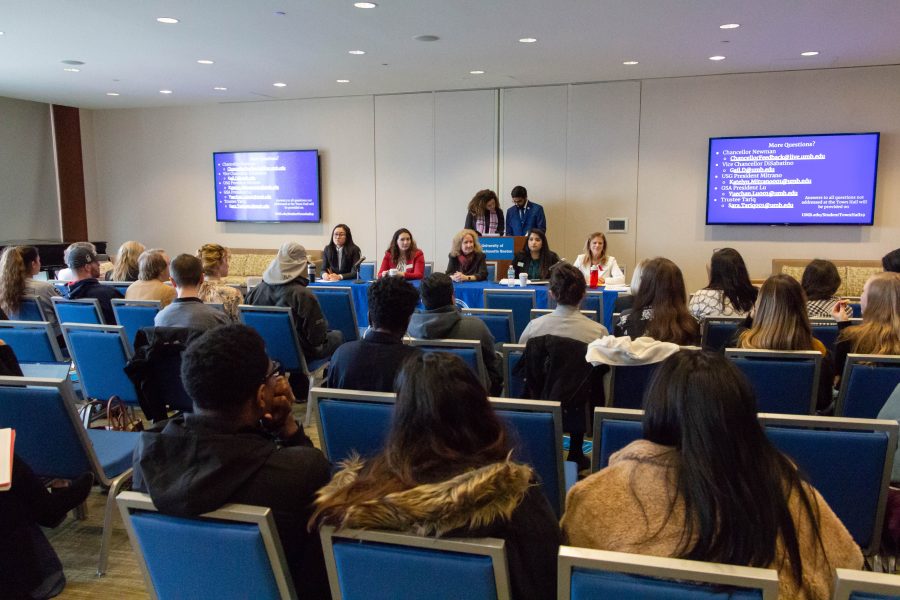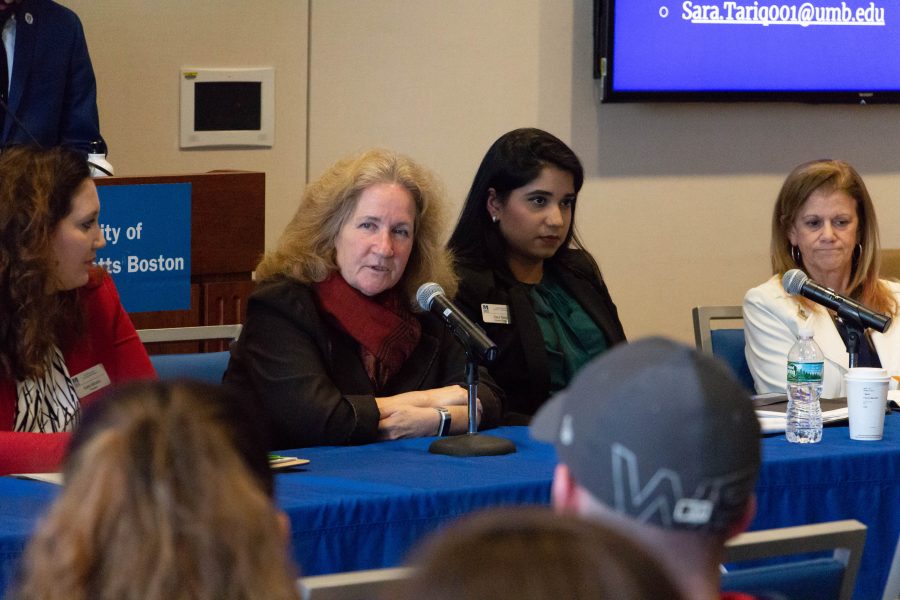The first held Student Town Hall, titled “Students First, Students Always,” had panelists: Interim Chancellor Katherine Newman, Vice Chancellor Gail DiSabatino, Undergraduate Student Government Katelyn Mitrano, Graduate Student Assembly President Yuechan Lu, and Student Trustee Sara Tariq to answer questions for students. Audience members from administration and police, to support the cause, were also there. Students tapped their I.D.s for attendance, got food, and the event was off to a start.
April 9—In the Alumni Lounge at the University of Massachusetts Boston, future President of USG, Sam Zeno, and Student Trustee Kush Patel were front and center to read off questions for the present administration. The questions were from USG tabling around campus with one of the first questions asking: “How do you expect students to graduate in a reasonable amount of time when departments don’t have reasonable teacher to student ratios in mandatory classes? Especially when teachers only intend passing half the class due to his or her teaching style … ” Interim Provost and Vice Chancellor for Academic Affairs Emily McDermott stepped up to answer this question. “This issue came to me in the middle of the semester when it was raised. As I understand the basic facts, my office has looked into the facts and I think we have a pretty good handle on what happened in this case. There was a Computer Science course, a 300-level Computer Science course cross-listed with math which had an original enrollment cap of 75 students. So many students were on the waitlist that the professor kindly put, perhaps … imprudently decided to take an extra 20 students into the class. So he accepted 90—over 90—students into the class at that point.” She went on to say how after he cut out more homeworks and half the class failed the first exam. The professor made a confusing remark on, “He talked about getting 60 percent to pass the test, I believe some of them interpreted that as he wanted to wanted to fail.” Students went to McDermott and the Chancellor on the matter and it was sorted out and for students to be able to come to them for them to straighten everything that needs to be fixed.
A later general question was on the recent parking fee affordability. Newman was the first to answer: “The parking rates on campus have not been raised for 14 years; meanwhile, various costs have gone up that we are obligated to recover. Otherwise, we’re using your tuition dollars to subsidize parking at even greater rate that we are now and we really can’t do much more of that. I would also say that about two-thirds of students are on public transit. So, parking rates don’t actually affect what I think is, in many ways, a more serious problem, which is how do we find a way to make the T, or other forms of public transit, more affordable for the majority of our students who use public transit. I use it myself every day; and so, if I were able to do this, I know there is a measure before you—or will be—I believe that students are voting on.” Zeno was able to interject with, “They have.” Newman continued her statement: “They already have? To create a fund to help subsidize the T. That is what I’d most like to do, is to both persuade the city of Boston to help them support students on public transit as they do for K-12 students.”
Vice Chancellor DiSabatino is proud of what student affairs is doing and wants to get more events around campus. She informed the audience to always look at the Mass Media for the weekly calendar and to sign up for things on UMBeInvolved. DiSabatino is continually working with students to keep the campus alive and, although it’s a continuous work-in-progress, to make sure there’s plenty of opportunities for students to get involved.
When asked about long wait-time for counseling at UMass Boston, Chancellor Newman answered, before calling on the Executive Director at University Health Services, Robert Pomales, “Let me just say, this is a national problem, there is a huge spike in demand for counseling services all across the country.” Pomales stood up from the back of the audience that extended wait time is very long [average 5-6 weeks] and training counselors takes a while. He assured the attendees they are working on it and that there’s a 24/7 distress phone number to call.
A Q&A popped up at the end where students were able to ask the panelists questions themselves. One student, a junior biology major, Austin Schofield, asked about what will happen to the greenhouse once the Science Center building is knocked down, scheduled to happen in Summer of 2020, and made into a quad for the campus. The answer for his question was that there is currently no funding at the university for the greenhouse but they are looking for funding and are “open to that conversation.” Another asked about pre-med students signing up for biology classes while majoring in other majors besides those that are STEM based. She was able to get the email of Emily McDermott to look further into the matter. All in all, most questions were able to be answered and there are plans for another Student Town Hall meeting in the future.


